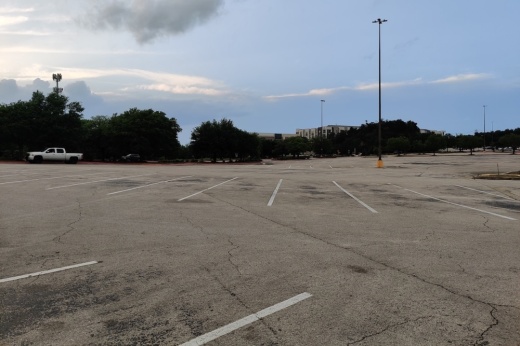What’s happening
New construction almost everywhere in the city must follow guidelines mandating a minimum number of parking spaces. Rules lay out different minimums based on either set numbers or square footage calculations that apply to all kinds of development, ranging from housing and retailers to funeral parlors and art galleries.
On May 4, City Council will vote on a resolution from District 9 Council Member Zo Qadri that would start the process of eliminating parking mandates from Austin’s land development code—with an exception for accessible spaces. Qadri’s measure asks for a finalized code amendment to come back to council before the end of the year.
“Instead of using dubious formulas to mandate how much parking is included in every new development, I believe we should allow individual property owners to decide what levels are appropriate. ... I do not think it is appropriate for our code to presume that every adult will need a place at every destination in which to store their car while at the same time, our own stated goals envision a community where more people get around on trains, buses, bikes, feet, and other means,” Qadri said in his May 1 newsletter.
The push to wipe out parking mandates in all cases comes on the heels of a similar proposal brought by District 3 Council Member José Velásquez aimed only at bars that was approved in April.
The context
If Qadri's item ends up passing, developers would not be banned from adding any parking going forward. Rather, projects could come together with as many—or few—spaces as desired.
Supporters including members of the Austin Parking Reform Coalition have said the change is needed for many reasons: helping small businesses seeking to start up or expand, reducing costs for builders, improving the environmental impact of new development, and cutting emissions and overall vehicle reliance.
The high cost of building parking has also been cited by the city as a driver of the rising local cost of living. A 2016 Fregones and Associates analysis included in Austin’s 10-year Strategic Housing Blueprint found housing gets less affordable as more parking is added.

In downtown Austin—where parking limits have already been rolled back—some of the city’s most prominent office and residential projects still include multiple stories of parking decks with dozens or hundreds of spaces. Still, parking can be tweaked in line with demand and is often a necessity to secure investor funding.
On the other end, the city’s Affordability Unlocked program already allows developers to cut down on parking well beyond standard limits for housing aimed at lower-income earners. Affordable developer Foundation Communities has several communities—such as the soon-to-open Zilker Studios off South Lamar Boulevard—that feature parking levels below city minimums based on their tenants’ needs; the 110-unit Zilker Studios complex will feature only 22 parking spots.
Under current policy, Executive Director Walter Moreau said the affordability program’s loosened rules allow his team to decide how to build—flexibility that is not allowed for most developers under current code. Zilker Studios will house individuals exiting homelessness who are less likely to be car dependent, leading to the 5-1 parking-unit ratio, while other Foundation Communities properties designed more for families may feature a 1-1 ratio.
Moreau said wiping away parking rules may end up as a positive overall, although he cautioned that some developers could end up building fewer spaces than they end up needing without a set minimum.

Planning Commissioner Greg Anderson, the director of community affairs at Austin Habitat for Humanity and a longtime critic of the city’s development rules, said he has frequently seen parking mandates cut down on Habitat projects and make new units more expensive to live in. He said the cost of adding Austin's required parking can start at around $10,000 for an on-street spot and rise as high as $60,000 for structured or underground spaces, money and physical space that pull from the end product of affordable housing.
“Our land development code today cares more about housing automobiles than it does housing people. We mandate parking in such ways—conversely prohibiting housing in so many other ways—and by allowing open-option parking to exist, then we’re going to truly allow for the creativity that a city our size deserves,” Anderson said of the proposed code update.
Daniel Kavelman, an organizer with the urban planning nonprofit Farm&City, said the local parking coalition has been working for about a year to strike down parking minimums in Austin. Among the reasons he supports rolling back the policy is its present-day effect of adding to sprawl with more impervious surfaces such as parking lots, which can increase urban heating effects as well as leading to drainage and flooding issues.
Austin is not the first municipality to look at eliminating parking rules, and Kavelman said large cities such as Buffalo and Seattle serve as examples of places that have seen positive outcomes from the shift. A University of Buffalo study found almost half of major projects there reduced their parking counts in the two years after the change, and more high-quality development could be made possible without the requirement in place.
“It’s past time that Austin joins the increasing list of cities nationwide that are giving property owners the freedom to choose how much parking they should provide rather than dictating those levels to them,” Qadri said in a statement.
Felicity Maxwell, a member of Austin’s parking coalition and board member at the urbanist group AURA, said she sees Qadri's proposal as one that will benefit places such as small businesses, day cares, bars and affordable housing projects. She also said removing the parking policy would encourage some changes in the Austin development scene while still leaving all parking options open.
“When we loosen those restrictions, we see A, the market responding naturally anyway, so parking doesn’t all just disappear. And B, in situations where we’re really proactive, we actually get better projects,” she said.





